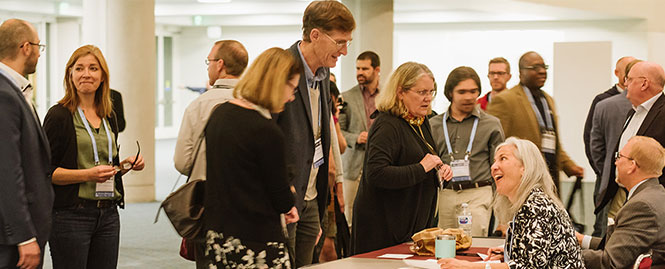Friday, November 21
3:30 - 5:30 PM
Location: TBA
Presentations
Dana Harris, Trinity International University, Moderator, Introduction and Welcome
Canonical Pressure from the Other Direction: Mal. 3:19–24 [MT] in the Law and Prophets and the Presentation of Jesus
Heath Thomas, Oklahoma Baptist University
In Pigment and Stone: Early Christian Canon Consciousness and Visual Production
Megan DeVore, Colorado Christian University
Testamentary Priority: Canon-Consciousness in Contemporary Christian Biblical Interpretation
Stephen Chapman, Duke University
Craig Bartholomew (Kirby Laing Centre for Public Theology in Cambridge), Respondent
Fri Nov 22
3:30 - 5:30 PM
Indigo E (Second Level) - Hilton Bayfront
The earliest thought and literature in the Christian tradition took shape within the context of canon consciousness. This consciousness included a developing tradition and awareness of canonical (i.e., scriptural) literature arising within the early Jesus movement. More significantly, however, the movement begins and evolves within the context of its canonical (i.e., normative) kerygma. This canonical kerygma then both shapes the development of canonical literature and creates a definite hermeneutic relation between this newer literature and the body of texts the movement inherited from long-standing traditions within Judaism. Modern interpreters frequently have difficulty grappling with this relation in ways that avoid reductionism—either by fitting the relation into the boundaries of modern literary and historical approaches or by dismissing this relation because it clearly does not fall within the bounds of such approaches. In both cases, the absolutizing of modern hermeneutic paradigms short circuits efforts to grapple with the testaments’ hermeneutic relation. Instead, this new project begins by assuming the legitimacy (at least as a historical phenomenon) of the two testaments’ hermeneutic relation and the various interpretive phenomena this relation produces. From this point, the project then seeks to explain the canonical consciousness that generated this relation and enables its continuing hermeneutic relevance for Christian communities in subsequent centuries. To join the group’s mailing list, please register at jdavidstark.com/ibr.
David Stark, Faulkner University, Presiding (5 min)
David Stark, Faulkner University
Canon-Consciousness as the Relationship between the Testaments (20 min)
Tag(s): Theological Interpretation (Interpretive Approaches), History of Interpretation (Interpretive Approaches), Christian (Ideology & Theology)
Dana Harris, Trinity International University
Interpreting and Reinterpreting the Canonical Whole: The Appropriation of Zechariah in Revelation (25 min)
Tag(s): Theological Interpretation (Interpretive Approaches), Latter Prophets - The Twelve - Zephaniah (Biblical Literature - Hebrew Bible/Old Testament/Greek OT (Septuagint)), Revelation (Biblical Literature - New Testament)
Collin Cornell, Fuller Theological Seminary
The Bible Is Not One Big Unilinear Story: Canon Consciousness and the Geometric Bible (25 min)
Tag(s): Theological Interpretation (Interpretive Approaches), Redaction Criticism (Interpretive Approaches), Torah/Pentateuch (Biblical Literature - Hebrew Bible/Old Testament/Greek OT (Septuagint))
Scott Hafemann, University of St. Andrews, Respondent (25 min)
Discussion (20 min)
4:00 to 6:00 pm
11/18/2023
Conference Room 6
The theme for 2023 will be “Appropriating Hebrews’s Scriptural Hermeneutic for the 21st Century.” For more information, contact David Stark ([email protected]) and Dana Harris ([email protected]).
Dana Harris, Trinity Evangelical Divinity School, Presiding (5 min)
David Stark, Faulkner University, Presiding
Rodrigo de Sousa, Institut Protestant de Théologie, Montpellier, Hermeneutics and Narrative in the Epistle to the Hebrews (20 min)
David Moffitt, University of St Andrews
Reading the Old Testament Christologically with the Author of Hebrews (20 min)
Discussion (20 min)
Business Meeting (20 min)
The Relationship between the Old Testament and the New Testament
3:30 PM to 5:30 PM
11/19/2022
Governor's Square 11 (Plaza Tower - Concourse Level) - Sheraton Downtown (SD)
The theme for 2022 will be “Appropriating Hebrews’s Scriptural Hermeneutic for the 21st Century.” For more information, please contact Dana Harris ([email protected]) and David Stark ([email protected]).
Dana M. Harris, Trinity Evangelical Divinity School, Introduction (5 min)
Nick Brennan, Westminster Seminary California
"As It Was in the Beginning": Deontic Origins and Creational Hermeneutics in Hebrews (20 min)
Alexander Stewart, Gateway Seminary
The Rhetorical Use of Old Testament Narratives in Fear Appeals in Hebrews: Hermeneutical Observations (20 min)
Bryan R. Dyer, Baker Academic
Who Tells Your Story: Situating the Reader within the History of Israel in the Epistle to the Hebrews (20 min)
William Olhausen, St. Matthias' Church
Hebrews and the Spirit of Hermeneutics: Participation and Experience in the (Ideal) Sermon Situation (20 min)
Gareth Cockerill, Wesley Biblical Seminary (emeritus), Respondent (15 min)
Discussion (20 min)
11/19/2021
3:30 PM to 5:30 PM
Room: Conference Room 6 - Marriott Rivercenter
Creighton Marlowe (co-chair; moderator), Associate Professor of Old Testament, Evangelische Theologische Faculteit, Leuven
Welcome and Introduction to the Topic (5 min)
Introduction of New Co-Chairs for 2022-: Old Testament and New Testament (5 min)
Gareth L. Cockerill (co-chair), Professor Emeritus of New Testament & Biblical Theology
Sinai in the Letter to the Hebrews: God Speaks Today (20 min)
Dana M. Harris
Associate Professor of New Testament, Trinity Evangelical Divinity School
Hebrews as a Hermeneutical Lens on the Old Testament (20 min)
J. David Stark, Winnie and Cecil May Jr Biblical Research Fellow, Kearley Graduate School of Theology, Faulkner University
Productive Prejudgments in Hebrews’s Hermeneutic: A Method and Test Case (20 min)
Ardel B. Caneday , Emeritus Professor of New Testament & Greek; University of Northwestern – St. Paul)
The Exegetical Significance of the Old Testament’s Silence in the Case of Melchizedek’s Ancestry and Progeny in Genesis 14 (20 min)
Q&A with Panel of Speakers (15-20 min)
Business: Plans for 2022 and Future requests (10 min)
[ibr_research_group year="2020"]
This year’s theme is “The Continuation and/or Discontinuation of National Israel according to the OT and NT.” It will revolve around the fulfillment of the OT promises regarding the return and renewal of Israel after its defeat and deportation. We explore questions such as: Are the OT promises conditional, unconditional or a mixture? Has this return “to the land” already happened or is it yet future? If already fulfilled, when? In OT or post-OT/NT times? If not, why? Is the fulfillment national or spiritual? Does so-called “Replacement Theology” need to be replaced? Is it exegetically defensible or not? Does any view deserve the indictment “anti-Semitic?” How does Messianic Judaism fit or not fit the nature of the NT churches or what Jesus called “my church” he would build?
- Gareth Cockerill, Presiding
- David Stark, Faulkner University
To Your Seed I Will Give…: The Land(s) Promised to Abraham in Genesis and Second Temple Judaism (20 min)
- Joel White, Freie Theologische Hochschule Gießen
John’s Baptism as a Symbolic Enactment of the Return from Exile (20 min)
- Joshua Coutts, Providence Theological Seminary
“My people will know my name”: Jewish Identity and the Name of God in John’s Gospel (20 min)
- Creig Marlowe, Evangelische Theologische Faculteit, Respondent (20 min)
- Discussion (25 min)
This year will engage two books: John Walton, Old Testament Theology for Christians (IVP Academic, 2017), and Roy Gane, Old Testament Law for Christians (Baker Academic, 2017).
-
Creighton Marlowe, Evangelische Theologische Faculteit, Presiding
-
Creighton Marlowe, Evangelische Theologische Faculteit, Introduction (10 min)
-
Gary Cockerill, Wesleyan Biblical Seminary (Emeritus)
Review of J. Walton’s Old Testament Theology for Christians, and R. Gane’s Old Testament Law for Christians (20 min)
-
Richard Averbeck, Trinity Evangelical Divinity School
Review of J. Walton’s Old Testament Theology for Christians, and R. Gane’s Old Testament Law for Christians (20 min)
-
John Walton, Wheaton College (Illinois), Respondent (15 min)
-
Roy Gane, Andrews University, Respondent (15 min)
-
Discussion (40 min)
This year’s theme is the Psalter as a Source for Divine-Human Christology.
-
Gareth Cockerill, Wesley Biblical Seminary, Presiding
-
Gareth Cockerill, Wesley Biblical Seminary, Introduction (5 min)
-
Keynote Address
-
Paper Presentations
-
Rick Boyd, Wesley Biblical Seminary
The Psalms: A Foundational Source for Matthew’s Portrait of Jesus (20 min)
-
W. Creighton Marlowe, Evangelische Theologische Faculteit
Paul’s Christological Use of the Psalms in Rom 3:4–18 (20 min)
-
Terence J. Kleven, Central College
The Kingship and Priesthood of Melchizedek, David, and the Messiah in Psalm 110 (20 min)
-
Discussion (20 min)
Nov. 17, 3:30–5:30pm Suffolk (Third Level) – Boston Marriott Copley Place (MCP)
There is no call for papers for this group. The following invited papers will be presented with time for presenter-responses and audience participation:
-
Richard M. Davidson (Prof. of OT Interpretation; Andrews University: Seventh-day Adventist Theological Seminary)
Did the New Testament Writers ‘Twist’ the Scriptures? An Exploration of the Old Testament Warrant for Biblical Typology.
-
Daniel M. Gurtner (Prof. of New Testament; Bethel Seminary)
Typology in the Matrix of Biblical Interpretation in Second Temple Judaism
-
Dana M. Harris (Assoc. Prof. of New Testament; Trinity International University: Trinity Evangelical Divinity School)
Typology, Allegory, or a Bit of Both? Sarah and Hagar in Galatians 4
-
Gareth Lee Cockerill (Academic Dean and Prof. of Biblical Interpretation and Theology; Wesley Biblical Seminary)
Hebrews, Typology, and Contemporary OT Interpretation


